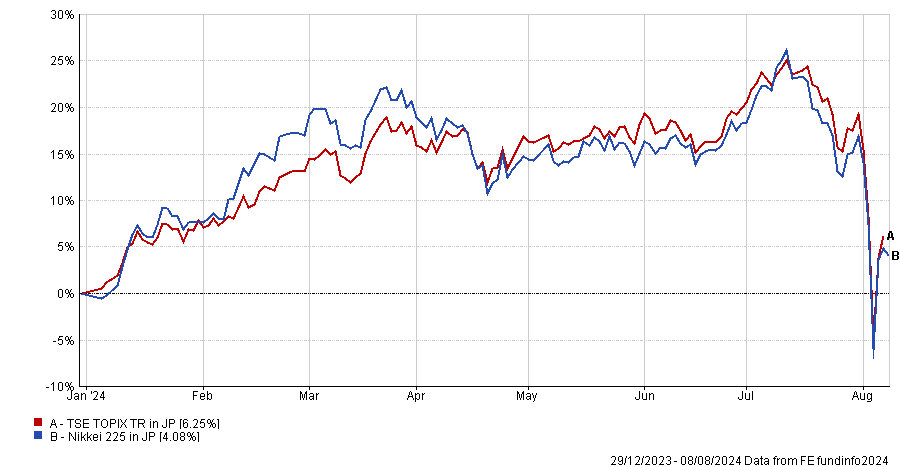Japanese stocks have corrected by more than 20% from their recent peak on 11 July 2024, while on Monday 5 August the market suffered its worst single-day slide since Black Monday in 1987, although it recovered in subsequent days.
Nicholas Price, portfolio manager of Fidelity Japan trust believes the “short-term unwinding of positions has gone too far” and is taking advantage of the indiscriminate selling.
“Some semiconductor-related and small-to-mid-cap growth stocks have become oversold and I have been selectively buying at the margin while reconfirming fundamentals with our analysts,” he said.
Meanwhile, as the likelihood of additional rate hikes by the Bank of Japan has diminished, he has slightly reduced his positions in bank stocks.
Carl Vine, manager of M&G Japan and M&G Japan Smaller Companies, is looking for “baby-with-the-bathwater” situations as well as ways to “add portfolio beta”.
“We have added to some names where undue selling was seemingly illogical and related purely to contagion. We have also tilted modestly away from defensive names towards names being sold indiscriminately,” he said.
“With weak hands seemingly flushed out in recent days, the price one must pay for ownership in Japan has shrunk despite robust fundamentals. We believe that Japanese equities represent an attractive, structural investment opportunity with an asymmetric prospective payoff profile.”
Year-to-date performance of Nikkei 225 and TOPIX in yen terms

Source: FE Analytics
Evaluating the events of the past week, Price said there were distinct phases within the selloff. First, in the immediate aftermath of the Bank of Japan’s rate hike, banks rallied but exporters lost ground amid a strengthening of the yen.
Then on Friday 2 August, year-to-date winners sold off as investors took profits from financials, global cyclicals and tech stocks. This was followed up on Monday 5 August with a sharp correction in financials and commodity-related sectors.
“Defensive and domestic-oriented segments of the market have held up relatively well in comparison,” he said. “In terms of style, there has been a clear rotation from value to low-vol and oversold quality.”
Overseas investors were net sellers of Japanese stocks in the second half of July and the unwinding of speculative positions has accelerated.
However, selling activity was primarily driven by systematic hedge funds and managed futures strategies rather than long-only investors, Price pointed out. Vine added that long/short equity managers unwound their exposures particularly rapidly.
The confluence of the Bank of Japan hiking while the US Federal Reserve took a dovish stance “reverberated through FX markets” as the yen started to strengthen. “As this unfolded, short-term and aggressive volatility-contagion ensued,” Vine said. “Japanese equities were at the tip of this spear, but regional equities across Asia also experienced ripples.”
Masaki Taketsume, who manages Schroder Japan, agreed with this analysis. “Clearly, the market turmoil was triggered by the sharp appreciation of the yen, therefore, exporters (cyclical sectors such as auto and machinery) suffered most while domestic-oriented sectors performed okay,” he said.
“The market also faced huge selling pressure for profit taking, so the past outperformers including technology and financials were hit severely. On the other hand, defensive sectors such as pharmaceuticals and telecoms held up well.”
Taketsume is not making significant changes based on market turbulence and said his portfolio maintains its bias towards value, small- and mid-cap, and domestic exposures.
Vine also argued for stoicism. “Despite unusual volatility, sentiment on the ground in Japan has been relatively calm,” he said.
“The Japanese economy continues along its path of structural improvement. Stock market earnings remain solid thanks to genuine self-help and ongoing structural reform of business models and capital policies. Earnings grew some 12% in the past financial year and earnings in the current fiscal year appear to be off to a strong start.”
Price concurred. Once the selling has run its course, he expects fundamentals and valuations to come back into focus. The Tokyo Stock Exchange’s corporate governance reforms, including measures to enhance capital allocations and tackle low valuations for all listed companies, continue to provide a tailwind.
“We believe that Japan’s economic shift to moderate inflation and its impact on spending and investment decisions by households and corporates, combined with steady progress in governance reforms, represent multi-year structural trends that are supportive of Japanese stocks over the longer term,” he said.
“Companies that are committed to balance sheet change by optimising their capital structures, enhancing cash allocation and payout policies, and eliminating idle assets and cross shareholdings, offer attractive opportunities for investors.”
The recently concluded fiscal 2023 reporting season included “a notable jump in share buybacks”, resulting in a significant increase in total shareholder return yields for some of the Fidelity Japan trust’s holdings.
“Through our engagements, we are seeing growth and mid-cap companies become more active in their shareholder returns. Given that mid/small-caps have a large presence both in absolute numbers and proportion that trade below book value, there are grounds for optimism,” Price said.
‘Smid’-caps account for around 90% of the TOPIX universe but “almost all smaller companies have little or no street coverage and around 60% of mid-caps have limited coverage”, he said. This can create “extreme mispricings” and Japanese mid-caps are currently trading at a “steep” price-to-book discount to large-caps.
Naoki Kamiyama, chief strategist at Nikko Asset Management, also remains positive. “The narrative of Japan fully shaking off deflationary pressures thanks to rising real wages is still intact. Latest data showed that wages are continuing to rise, which is leading to increased consumption,” he said.
Even though the Nikkei has essentially gone back to where it started 2024, its current level is “a toe-hold for a path back to recovery”.





